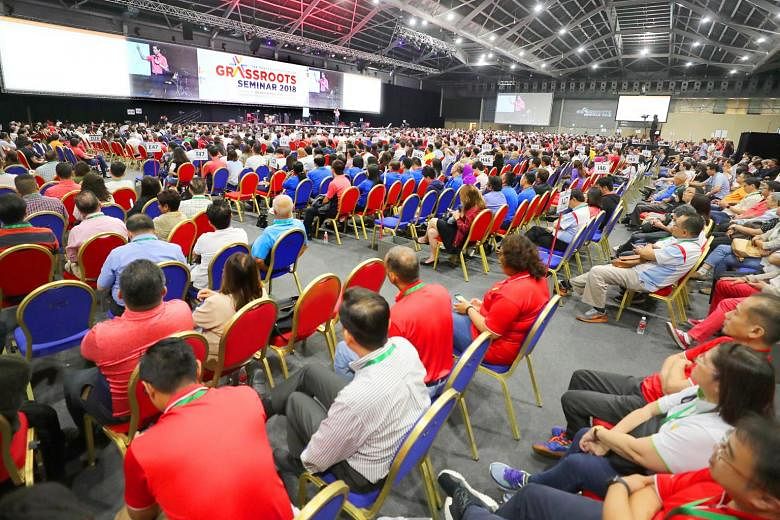SINGAPORE - Emerging phenomena such as online falsehoods and religious exclusivism can damage the social fabric, and the grassroots movement, whose job is to keep Singapore cohesive, needs to focus on them, the People's Association (PA) deputy chairman Chan Chun Sing said on Saturday (Oct 6).
He said, for example, that fake news "has the potential to split communities apart, to divide the people from the government, (and) to divide the people from each other."
To counter this, people need to be educated so that they take responsibility when forwarding messages, verifying information before doing so.
"Then there's also the community effort, where we must come together to verify some of this information, to provide the cross-check for each other," said Mr Chan, who is also Minister for Trade and Industry.
Referring to an incident two years ago - in which a hoax photo of a collapsed housing project in Punggol was circulated online - Mr Chan said community leaders can step up to dispel such untruths.
Mr Chan said a "verified, trusted source of information" is needed and community leaders can play a useful part because "they are on the ground and they know the situation".
Mr Chan was speaking to reporters after the Grassroots Seminar held at the Singapore Expo, an annual event to chart the strategic direction for PA and grassroots organisations for the next year. More than 2,500 grassroots volunteers along with corporate and community partners attended the event.
Mr Chan listed three other challenges facing the grassroots movement's work to preserving Singapore's harmony, and which was also discussed during the seminar.
One is the rise of religious extremism or exclusivism, which "means that people are more and more comfortable mixing around only with people of the same kind", Mr Chan said.
The challenge facing the PA is how to "draw people out from their shell" to build a cohesive community as one Singapore, he added.
Another challenge is the plethora of causes in society, which are championed by different groups of people. Each in itself is good, said Mr Chan.
The challenge here is for each group to have "a sense of perspective of the overall challenges facing the country" so that when they champion their respective causes this is within the context of helping the country to move forward together as one, Mr Chan said.
Finally, the challenge is of enhancing the social mixing in Singapore, and how to bring people from different backgrounds together, Mr Chan said.
Mr Chan said the People's Association is leveraging on technology to maximise the use of its resources. Grassroots organisations are also using data to reach out to people who may not have joined community activities and to tailor programmes which appeal to participants.
This approach, for example, has helped the advisory committee of imPAct@Hong Lim Green organise activities in the lead-up to next year's (2019) launch of the specialised community club, which caters to professionals, managers, executives and technicians (PMETs).
Committee member Anthony Lee, 44, said data on PMETs provided his team with a better understanding of their behavioural patterns and what appealed to them.
This led to a mass exercise session organised by the PA in July (2018), which was held simultaneously at 10 locations and attracted more than 500 working professionals.
Mr Lee said: "If we want to organise fitness activities, we need to understand what is their behaviour and perception towards keeping fit. Are they too busy? Maybe if the activities are conducted at particular timings and near to their workplaces, they'll be keen. The data allows us to plan more strategically."


